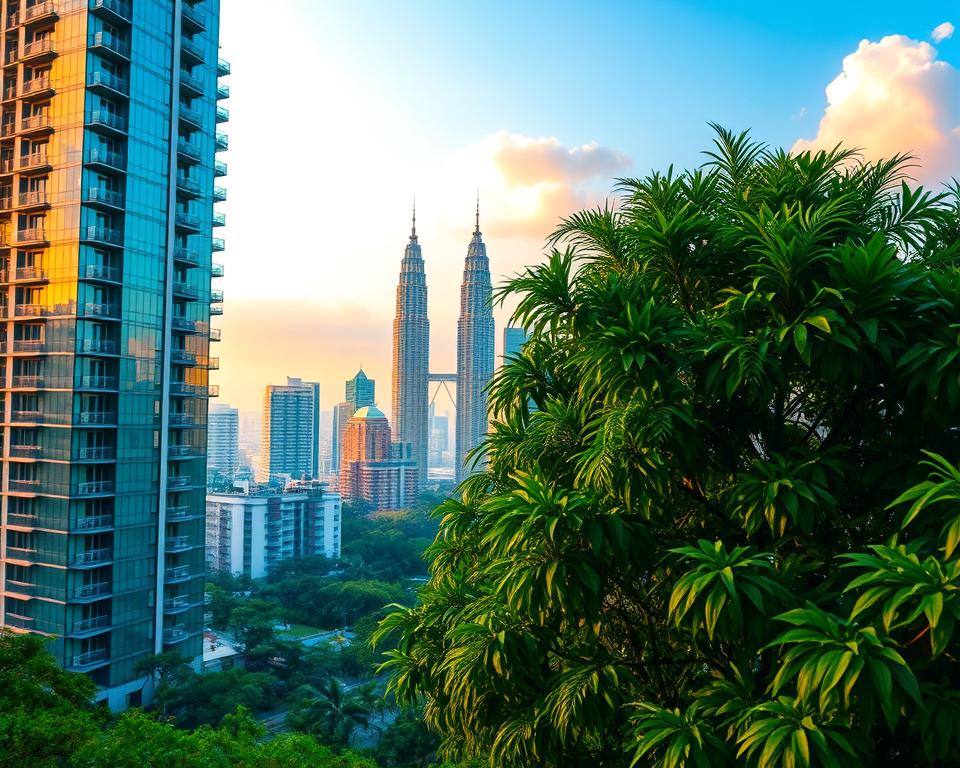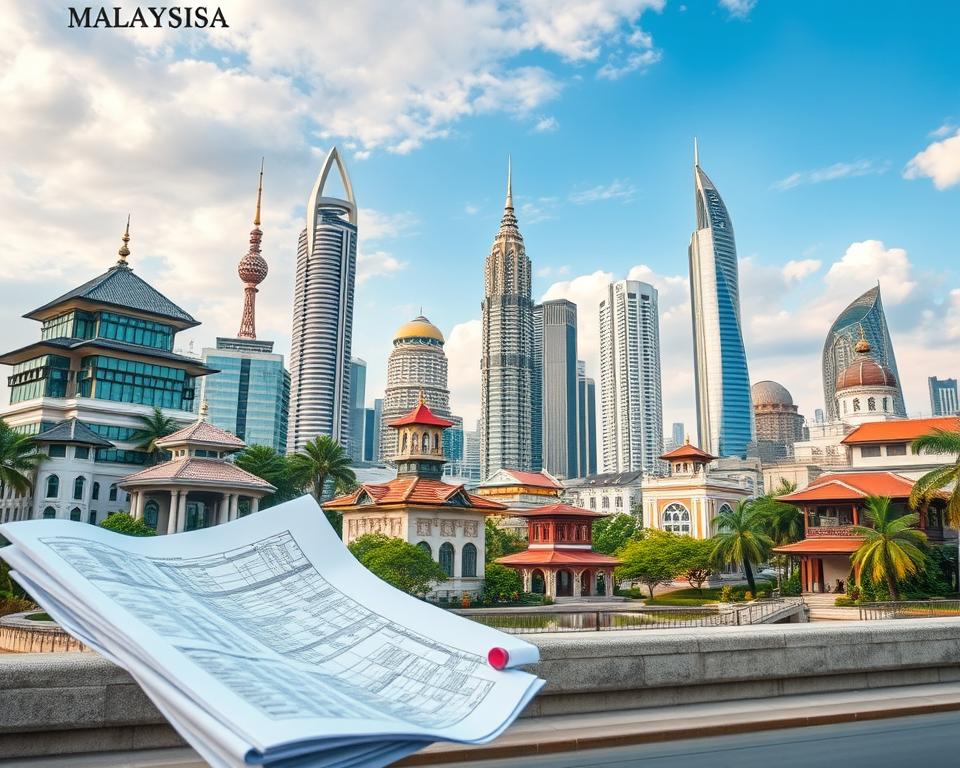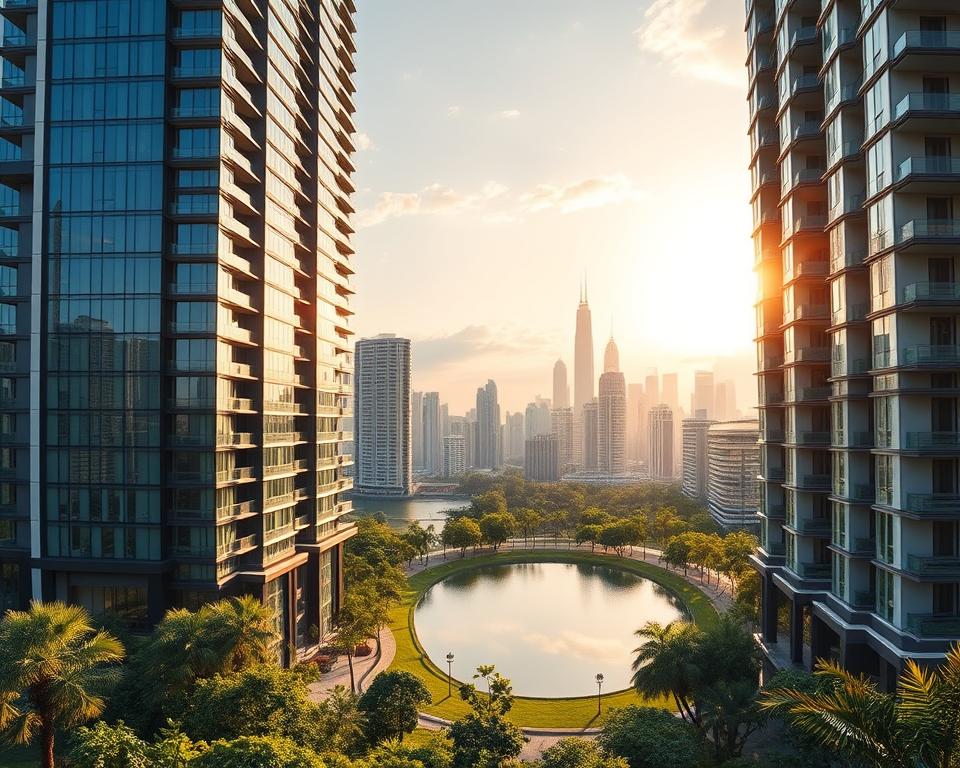Are you considering real estate as a viable investment option? Malaysia stands out as an attractive destination, thanks to its strategic location along the Strait of Malacca and business-friendly policies.
Unlike many Asian countries, Malaysia allows foreigners to own land, opening up a wide range of property opportunities beyond just condominiums. With a growing population projected to exceed 40 million by 2050, the property market in Malaysia offers a compelling combination of affordability and long-term appreciation potential.
For first-time investors, understanding the fundamentals of the Malaysian property investment market is crucial. This includes legal considerations, location analysis, and investment strategies. This comprehensive guide will walk you through everything you need to know to make informed decisions.
Table of Contents:
- Understanding Malaysia’s Property Market
- Legal Framework for Foreign Property Investors
- Types of Property Investments in Malaysia
- Best Locations for Property Investment in Malaysia
- Property Investment Strategies in Malaysia
- Financial Considerations for Property Investment in Malaysia
- Malaysia My Second Home (MM2H) Program
- Conclusion: Is Property Investment in Malaysia Right for You?
Understanding Malaysia’s Property Market
Malaysia’s real estate sector is witnessing significant interest from global investors due to its strategic location and investor-friendly policies. With a population of around 30 million people, Malaysia may be one of Asia’s smaller countries, but it offers a vast array of property investment opportunities.

Current Market Overview
The Malaysian property market is characterized by its openness to foreign ownership, making it an attractive destination for investors. Unlike some neighboring countries where foreign ownership is restricted to certain types of property, Malaysia allows foreigners to own land on a freehold basis, significantly expanding the scope of potential investments.
This openness, combined with a relatively transparent legal system and well-documented property rights, makes navigating the Malaysian real estate market easier for foreign buyers.
Why Malaysia Attracts Foreign Investors
Several factors contribute to Malaysia’s appeal to foreign investors. The country’s multicultural environment attracts a diverse range of international investors, including wealthy individuals from the Middle East, China, and Western countries.
- Malaysia’s strong Islamic Banking industry is a significant draw for investors from Muslim-majority countries.
- The Malaysia My Second Home (MM2H) program offers long-term visas to property investors, enhancing the country’s appeal for those looking to combine investment with lifestyle benefits.
- Foreign investors appreciate the country’s English-speaking environment and the ease of navigating the real estate market.
These factors, combined with a favorable investment climate, make Malaysia an attractive destination for foreign buyers and investors alike.
Legal Framework for Foreign Property Investors
Understanding the legal framework is crucial for foreign property investors in Malaysia. The country’s property market is subject to various laws and regulations that foreign investors must comply with to ensure a smooth transaction.
Can Foreigners Own Property in Malaysia?
Foreigners are allowed to own property in Malaysia, but there are certain conditions and restrictions that apply. The Malaysian government has implemented laws to regulate foreign property ownership, ensuring that it benefits the local economy.

Minimum Purchase Requirements
Foreign buyers are required to meet minimum purchase requirements when buying property in Malaysia. The minimum price threshold varies by state, with some states like Penang and Johor setting it at RM1,000,000 (~US$250,000), while others may have a lower threshold of RM500,000 (~US$125,000).
Restrictions on Foreign Ownership
There are several restrictions on foreign ownership of property in Malaysia. Foreign buyers are not allowed to purchase properties designated as “Bumiputra only,” which are reserved for ethnic Malay citizens. Additionally, agricultural land and properties categorized as low or medium-cost housing by state authorities are off-limits to non-citizens.
- Foreign buyers cannot purchase properties designated as “Bumiputra only,” which are reserved exclusively for ethnic Malay citizens.
- Agricultural land is generally off-limits to foreign investors, with some exceptions that may require special approval.
- Properties categorized as low or medium-cost housing by state authorities cannot be purchased by non-citizens, regardless of price.
- Some heritage buildings and properties with historical significance may be restricted to local buyers only.
- Despite these restrictions, Malaysia still offers foreign property buyers more options than most other Asian countries.
It’s essential for foreign property buyers to understand these regulations to make informed decisions when investing in Malaysian property or housing market.
Types of Property Investments in Malaysia
The Malaysian property market is characterized by a variety of investment options, catering to different investor preferences. This diversity allows investors to choose properties that align with their financial goals and risk tolerance.
Condominiums and Apartments
Condominiums and apartments are popular among investors due to their potential for rental income and capital appreciation. These properties are particularly sought after in urban areas like Kuala Lumpur, where demand for housing is high. Foreigners can own condominiums and apartments, making them an attractive property investment option.

Landed Properties
Landed properties, including houses and townhomes, offer investors a different set of opportunities. Owning land as a foreigner in Malaysia opens up various investment avenues, such as developing land or renting out properties. This type of investment can provide a sense of security and potentially higher returns, adding value to an investment portfolio.
Commercial Properties
Commercial properties, including office spaces, retail units, and industrial buildings, present a lucrative investment opportunity. These properties can generate higher rental yields compared to residential properties, often between 5-8%, depending on the location and type of property. Moreover, commercial leases tend to be longer, providing a stable income stream for investors willing to manage business tenants.
Some key benefits of commercial properties include:
- Diversification opportunities beyond residential real estate
- Higher rental yields compared to residential properties
- Unique investment opportunities like shophouses, which combine commercial and residential space
- Longer leases providing stable income streams
- Fewer restrictions for foreign investors, although minimum purchase requirements still apply
Best Locations for Property Investment in Malaysia
With its strategic locations and economic growth drivers, Malaysia presents numerous opportunities for property investors. The country’s diverse regions offer a range of investment options, from established cities to emerging markets.
Kuala Lumpur

Kuala Lumpur, being the capital, is a popular place to buy real estate. The best areas to invest in include the city center, where demand for luxury condominiums is high, and areas like Bangsar and Mont Kiara, known for their vibrant expat communities.
The property prices in Kuala Lumpur are relatively high compared to other parts of Malaysia, but the potential for investment returns is significant, driven by rental demand and capital appreciation.
Penang
Penang is Malaysia’s second-largest city and a hub for technology and manufacturing. It attracts investors with its well-planned infrastructure and high quality of life.
The property market in Penang is robust, with areas like George Town and Tanjung Tokong being particularly sought after.
Johor Bahru
Johor Bahru, located next to Singapore, benefits from its proximity to the economic giant. This city is experiencing rapid growth, driven by cross-border trade and tourism.
Investment in Johor Bahru’s property market is attractive due to its relatively lower prices compared to Singapore.
Emerging Markets: Kota Kinabalu and Kuching
Kota Kinabalu and Kuching are emerging investment markets in East Malaysia, known for their natural beauty and growing economies.
These city areas are experiencing growth in tourism, manufacturing, and resource exports, making them attractive for property investment. The prices remain lower than in more established markets, offering potential for higher returns.
Property Investment Strategies in Malaysia
Investing in Malaysian property can be a lucrative venture, but it’s crucial to have a well-thought-out property investment strategy. The right approach can help maximize returns and minimize risks.
Buy-to-Rent Strategy
The buy-to-rent strategy involves purchasing a property to rent it out to tenants. This approach can provide a steady stream of passive income. To succeed, investors should focus on locations with high demand for rentals, such as areas near universities or city centers. The rental income can help offset mortgage payments and other expenses.
House Flipping (Buy-to-Sell)
House flipping involves buying a property, renovating it, and selling it for a profit. This strategy requires a good understanding of the property market and renovation costs. Investors should look for undervalued properties in areas with potential for growth. It’s an option that can yield significant returns if executed correctly.
Short-term Rentals (Airbnb)
Renting out properties on Airbnb has become increasingly popular in Malaysia, especially in tourist areas like Kuala Lumpur and Penang. This approach can generate higher returns than traditional long-term rentals, with some owners reporting income up to three times higher. However, it involves managing the property like a business, including handling guest check-ins, cleaning, and maintenance.
When considering short-term rentals, it’s essential to weigh the pros and cons. While it can be lucrative, it also requires more effort and flexibility. Investors must also check with property management to ensure that short-term rentals are allowed.
- Short-term rental strategies are gaining popularity in tourist hotspots.
- Properties in central locations with good amenities are best suited for short-term rentals.
- Investors must consider additional operational costs, including cleaning and utility bills.
Financial Considerations for Property Investment in Malaysia
When investing in Malaysian property, understanding the financial implications is crucial. Investors must consider various costs and potential returns to make informed decisions.
Property Taxes and Fees
Property taxes and fees in Malaysia can significantly impact the overall cost of investment. Stamp duty is a major cost, ranging from 1% to 4% of the property’s purchase price, depending on the property value. Additionally, quit rent and maintenance fees are recurring expenses that property owners must pay.
Calculating Rental Yields
To evaluate the profitability of a property investment, calculating the rental yield is essential. The gross rental yield is calculated by dividing the annual rental income by the property’s value. For a more detailed analysis, the net rental yield considers additional expenses such as maintenance fees, quit rent, and property assessment.
- Annual Rental Income = Monthly rental fee x 12 months
- Property Value = Purchase Price or Current Market Value
- Annual Expenses = Installment / Maintenance fee / Quit rent / Sinking fund / Property assessment
Financing Options for Foreign Investors
Foreign investors have several financing options when purchasing property in Malaysia. While terms are generally less favorable than those for local buyers, there are alternatives to consider.
- Malaysian banks typically offer mortgages covering up to 70% of the property value, requiring a minimum 30% down payment.
- Loan tenures for foreigners are usually capped at 30 years or until the borrower reaches age 70.
- Some international banks with operations in Malaysia may offer more favorable terms to their existing customers.
- Developer financing packages are an alternative, offering payment plans with more favorable terms, particularly for new developments.
Malaysia My Second Home (MM2H) Program
The Malaysia My Second Home (MM2H) program is an attractive option for foreign nationals looking to invest in property or retire in a vibrant economy. This program offers a unique opportunity for individuals and families to reside in Malaysia, enjoying the country’s diverse culture and economic opportunities.
Eligibility Requirements
To be eligible for the MM2H program, applicants must meet certain requirements. The process begins with receiving a letter of conditional approval, after which they must place a fixed deposit in a Malaysian bank, undergo a medical examination, and obtain medical insurance. It’s noteworthy that the fixed deposit is only required after conditional approval is granted.
Benefits for Property Investors
MM2H participants enjoy numerous benefits, including the ability to bring family members under the same visa program. This includes spouses, children under 21, and even parents, making it an attractive option for families. Additionally, the program allows participants to import personal belongings and even a car tax-free, significantly reducing relocation costs.
- MM2H visa holders can apply for visas for their family members.
- The program provides access to Malaysia’s high-quality healthcare system at local rates.
- Participants can open Malaysian bank accounts and invest in local financial products.
- Unlike traditional investment visas, the MM2H program doesn’t require continuous investment beyond the initial requirements.
Conclusion: Is Property Investment in Malaysia Right for You?
With its business-friendly environment, Malaysia stands out as a prime destination for property investment in Asia. The country’s unique advantages, such as the ability to own land on a freehold basis, make it particularly attractive to foreign investors. While rental yields may be relatively low, the potential for long-term capital appreciation is strong, driven by Malaysia’s growing population and urbanization. The current low value of the Malaysian ringgit against major currencies further enhances the appeal. Investing in Malaysian real estate can yield significant returns for those with a long-term perspective.

